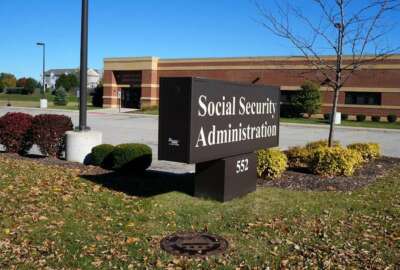SSA, AFGE renegotiate agreement to give employees more official time
SSA will restore previous levels of official time for union activities, but AFGE said more must be done to address staffing issues.
The Social Security Administration has plans to restore a few key parts of its national agreement with the American Federation of Government Employees.
After months of ongoing discussions, SSA and AFGE reached an agreement on July 25 to reinstate previous levels of official time for union activity, and the union’s use of SSA facilities, that existed in an earlier iteration of the national contract from 2012.
Rich Couture, AFGE’s spokesperson for SSA, told Federal News Network that settlement discussions earlier this year ultimately led to the changes to the contract. The new provisions of the national agreement will raise the caps on the maximum hours that union representatives can use toward union time, and put more available hours in a bank for other SSA employees.
“A lot of us were using our own personal time, nights and weekends, using earned leave and credit hours, to engage in representation of bargaining unit employees. We found ourselves very hamstrung,” Couture said.
The changes, which will go into effect on Sept. 23 after a 45-day implementation period, also include updates to the agency’s health and safety protocols, as well as the grievance and arbitration procedures, an SSA spokesperson wrote in an email to Federal News Network.
The discussions that led to the changes are partly in response to an executive order on protecting the federal workforce, which President Joe Biden signed during his first week in office. The order removed several workforce policies from the Trump administration, one of which cut the amount of paid time that employees can use for union activities.
And, there are more negotiations still on the table — SSA and AFGE have agreed to reopen six other contract articles, Couture said. The SSA spokesperson added that the agency looks forward to partnering with AFGE in the upcoming contract negotiations, in part, to try to resolve ongoing challenges with staffing and employee satisfaction.
“Social Security and AFGE have a mutual desire to make the agency more competitive in recruitment and retention, and to improve public service,” the SSA spokesperson wrote. “This important step forward reflects the parties’ mutual desire to continue to improve our relationship through good faith negotiation, which demonstrates respect and dignity for everyone affected and enables public service improvement.”
In a governmentwide pulse survey that federal employees took earlier this year, SSA received poor scores on questions about employee engagement and work-life balance.
“SSA is having trouble holding on to employees and attracting quality applicants. All of this boils down to the fact that the agency is not competitive in what it offers — in terms of pay, benefits, privileges, work-life flexibilities, telework, remote work and work schedule flexibilities,” Couture said.
The next step in making improvements to SSA recruitment and retention, Couture said, is to restore and expand employee rights and benefits more broadly.
“Up until recently, we have not been able to sit down to substantively address these issues with decision makers,” he said. “The union strongly believes that the parties should be further along this path of reconciliation and restoration of employee rights than we are. We really need to be making up for lost time.”
In April, SSA opened its doors to the public, a week after returning many agency employees to work in the office. Couture was AFGE’s chief negotiator for the agency’s office reentry agreement. He said the union is still pushing for more telework and remote work flexibilities for SSA employees.
“SSA needs to be more competitive with respect to telework,” Couture added. “It needs to find ways of maximizing telework in order to be competitive with other employers. It needs to offer a remote work program, which we currently don’t have.”
The agency is currently in a six-month evaluation period, which it said it hopes will inform leaders how to improve services and operate efficiently, while also hiring and retaining the best employees, the SSA spokesperson said.
Couture said SSA Acting Commissioner Kilolo Kijakazi has been open to working with AFGE, and expressed willingness to move forward in a more collaborative, positive and cooperative fashion.
“It’s going to be incumbent upon the agency to live up to that as we seek to make some very big moves,” he said. “Until the good deeds match the good words that we’ve been hearing, SSA is going to continue to experience these problems.”
Copyright © 2024 Federal News Network. All rights reserved. This website is not intended for users located within the European Economic Area.
Drew Friedman is a workforce, pay and benefits reporter for Federal News Network.
Follow @dfriedmanWFED
Related Stories




